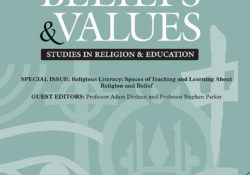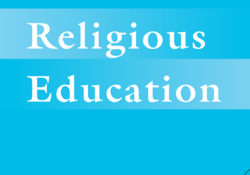tandfonline.com har udgivet en rapport under søgningen “Teacher Education Mathematics”: Faith, reason and religious education: an essay for teachers of religions in a sceptical age Link til kilde
Like this:
Like Loading...
tandfonline.com har udgivet en rapport under søgningen “Teacher Education Mathematics”: ABSTRACT ABSTRACT At present, there are relatively few international studies that reflect research in religious didactics from a metatheoretical perspective. Against this background, the fundamental question of this contribution is whether there are research designs that are typical for research in religious didactics (1.). For this purpose, research was conducted for a later Delphi study; its development (2.), results (3.), and open questions (4.) are presented below. The study does not only produce certain findings and problem indications with regard to research designs of religious didactics, but perhaps even in a general model for religious-didactic research. We regard the current status of this project as an interim result, which shall be examined in a subsequent round, taking into account the… Continue Reading →
Like this:
Like Loading...
tandfonline.com har udgivet en rapport under søgningen “Teacher Education Mathematics”: ABSTRACT Formulae display:?Mathematical formulae have been encoded as MathML and are displayed in this HTML version using MathJax in order to improve their display. Uncheck the box to turn MathJax off. This feature requires Javascript. Click on a formula to zoom. ABSTRACT Max Weber claims in his well-known book, The Protestant Ethic and the Spirit of Capitalism, that the emergence of capitalism had its roots in the Protestant work ethic. Becker and Woessmann’s seminal 2009 paper finds that the more likely relationship between Protestantism and economic prosperity runs via literacy. They claim that Protestants unintendedly acquired literacy skills that functioned as human capital in the economic sphere by adhering Luther’s call to learn to read the Bible on their own.… Continue Reading →
Like this:
Like Loading...
tandfonline.com har udgivet en rapport under søgningen “Teacher Education Mathematics”: ABSTRACT ABSTRACT Although religion has played a key role in reading instruction in many education systems, this position has been challenged by increasing religious diversity and the spread of non-religious worldviews. Simultaneously, there has been growing interest in the role of disciplinary literacy in education (i.e. the ways in which a discipline’s knowledge is created, shared and evaluated) as well as the role of the reader. Drawing on classroom observations and interviews in an exploratory study, the article focuses on how adolescents experience reading in religious education (RE). The study shows that students relate meaning-making in RE to developing respect and tolerance, that teachers focus on conceptual understanding while students request a focus on lived religion, and that student meaning-making… Continue Reading →
Like this:
Like Loading...
tandfonline.com har udgivet en rapport under søgningen “Teacher Education Mathematics”: ABSTRACT ABSTRACT This article presents analyses of curricula in religious education (RE) for public schools in Austria, Scotland, and Sweden. A curricula is the plan that outlines the goals, content and outcomes in education. A critical discourse analysis approach (CDA) is used to explore how each national RE curricula constructs (a) the aims, status and purpose of state-maintained RE (b) the teaching and learning objectives, and contents, and (c) what skills and attitudes the processes of learning aim to develop; together, these can be considered to construct students’ religious literacy in the curricula. Theoretical frameworks are from curriculum studies, as well as from literacy studies, with the aim of deepening the knowledge on RE, as well as the discussion on… Continue Reading →
Like this:
Like Loading...
tandfonline.com har udgivet en rapport under søgningen “Teacher Education Mathematics”: ABSTRACT ABSTRACT Through interviews with student participants and evidence submitted to earn digital badges, a number of indicators suggest that a religious school’s digital badges can provide opportunity to strengthen religious identity. In particular, student interviews and evidence supplied for the completion of learning objectives for digital badges indicate increases of religious salience (compared to secular practices), religious commitment within a community, and self-esteem based on religious identity. Recommendations are made for ongoing and future religious badge implementations on how to strengthen religious identity while meeting the requirements of authentic, quality assessments. Link til kilde
Like this:
Like Loading...
tandfonline.com har udgivet en rapport under søgningen “Teacher Education Mathematics”: ABSTRACT ABSTRACT Swedish preschools are supposed to be non-confessional. At the same time, they are supposed to pass on a cultural heritage of a nation where the Lutheran Church has permeated society for centuries. Based on a study of traditions and religion in Swedish preschools, this article describes and discusses how preschools work with religion as an aspect of cultural heritage and as regularly occurring activities and themes during the preschool year. The empirical data consist of a survey about traditions in preschools, video ethnography in two preschools, and group interviews with preschool staff. The article centres around the question of how a cultural heritage is passed on without simultaneously passing on religion. Although the data show that all preschools… Continue Reading →
Like this:
Like Loading...
eric.ed.gov har udgivet: This case study of a math and science teacher in a private religious school looks at the impact of a teacher’s religious beliefs on her experience of engaging with ethical issues in her practice. A Freirean ethical framework is used to analyze her struggles with differences between her own personal religious convictions and those of the school in which she teaches, avoiding undue influence on her students’ developing beliefs, and the inherent violence of schooling. This case provides an example of ways in which discussions with teachers about professional ethics might be broadened beyond codes and regulations to the everyday embodied, social milieu in which they work. Link til kilde
Like this:
Like Loading...






